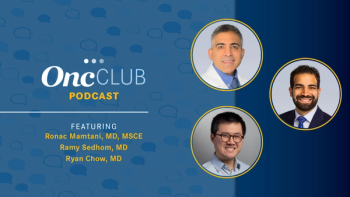
Katz Considers the Role of Neoadjuvant Chemoradiation in Borderline Resectable Pancreatic Cancer

Dr Katz discusses the implications of a recently published phase 2 study investigating neoadjuvant mFOLFIRINOX with or without hypofractionated radiation therapy results for patients with borderline resectable pancreatic ductal adenocarcinoma.
Welcome to OncLive On Air®! I’m your host today, Jason Harris.
OncLive On Air® is a podcast from OncLive®, which provides oncology professionals with the resources and information they need to provide the best patient care. In both digital and print formats, OncLive® covers every angle of oncology practice, from new technology to treatment advances to important regulatory decisions.
In today’s episode, I spoke with Matthew H. G. Katz, MD, chair of surgical oncology and professor at The University of Texas MD Anderson Cancer Center. Dr Katz served as the lead author for a recently published phase 2 study (NCT02839343) investigating neoadjuvant mFOLFIRINOX with or without hypofractionated radiation therapy results for patients with borderline resectable pancreatic ductal adenocarcinoma (PDAC).
At a median follow up of 42.9 months (95% CI, 39.7-43.4), the Kaplan-Meier–estimated 18-month survival rate was 66.7% (95% CI, 56.1%-79.4%) for the mFOLFIRINOX alone group vs 47.3% (95% CI, 35.8%-62.5%) in the chemotherapy plus radiation arm.
In our exclusive interview, Dr Katz said that routine radiation therapy is inappropriate for any stage of localized pancreatic cancer but added that there is a role for this modality in select patients.
___
That’s all we have for today! Thanks again to my guest, Matthew Katz, MD, and thank you for listening to this episode of OncLive On Air®. Check back on Mondays and Thursdays for exclusive interviews with leading experts in the oncology field.
For more updates in oncology, be sure to visit www.OncLive.com and sign up for our e-newsletters.
OncLive® is also on social media. On Twitter, follow us at @OncLive and @OncLiveSOSS. On Facebook, like us at OncLive and OncLive State of the Science Summit and follow our OncLive page on LinkedIn.
If you liked today’s episode of OncLive On Air®, please consider subscribing to our podcast on Apple Podcasts, Spotify, Google Podcasts, Amazon Music, and many of your other favorite podcast platforms,* so you get a notification every time a new episode is posted. While you are there, please take a moment to rate us!
Thanks again for listening to OncLive On Air®.
*OncLive On Air® is available on: Apple Podcasts, Google Podcasts, Spotify, Amazon Music, Audacy, CastBox, Deezer, iHeart, JioSaavn, Listen Notes, Player FM, Podcast Addict, Podchaser, RadioPublic, and TuneIn.






































